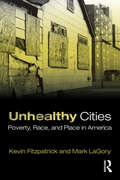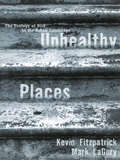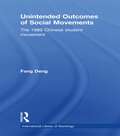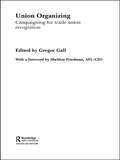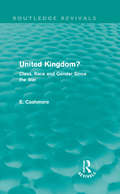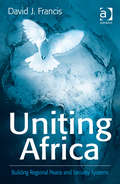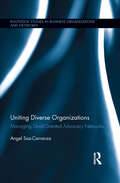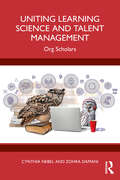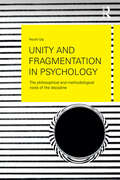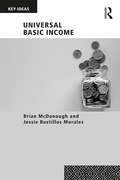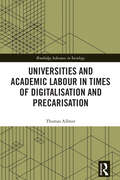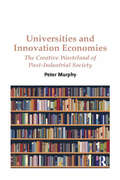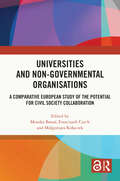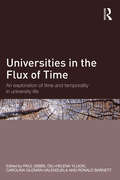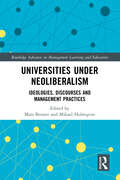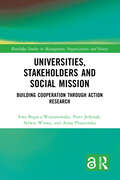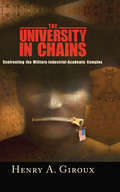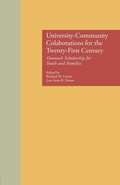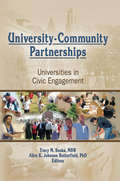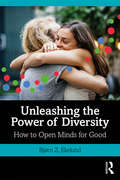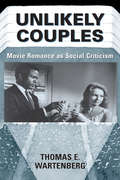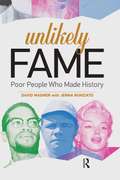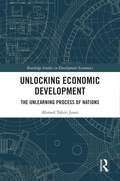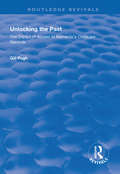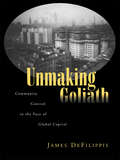- Table View
- List View
Unhealthy Cities: Poverty, Race, and Place in America
by Kevin Fitzpatrick Mark LaGoryThe purpose of this book is to show the important role that space and place plays in the health of urban residents, particularly those living in high poverty ghettos. The book brings together research and writing from a variety of disciplines to demonstrate the health costs of being poor in America’s cities. Both authors are committed to raising awareness of structural factors that promote poverty and injustice in a society that proclaims its commitment to equality of opportunity. Our health is often dramatically affected by where we live; some parts of the city seem to be designed to make people sick. The book is intended for students and professionals in urban sociology, medical sociology, public health, and community planning.
Unhealthy Places: The Ecology of Risk in the Urban Landscape
by Kevin Fitzpatrick Mark LaGoryFirst Published in 2000. Routledge is an imprint of Taylor & Francis, an informa company.
Unintended Outcomes of Social Movements: The 1989 Chinese Student Movement (International Library of Sociology)
by Fang DengWhy did the 1989 Chinese student movement end in violent confrontation at Tiananmen Square, despite the fact that both the Chinese government and the students very much wanted to avoid violence? This puzzle, which lies at the heart of the tragic events at Tiananmen, is addressed here from a fresh perspective that sheds new insight into these dramatic events. Throughout Unintended Outcomes in Social Movements, Deng applies the formal methods of game theory to elucidate some of the contingent, strategic decision-making by both sides in a social-movement/state confrontation, and how those decisions can – and did - lead to an unintended outcome. In identifying the necessary cause of the Tiananmen tragedy, namely a newly created social system with four highly specific properties, this book provides the first adequate explanation of the Tiananmen events. Because of this, it stands to make a significant stride toward convincing students of political conflict of the explanatory power of formal game-theoretic models. This book is an excellent source of reference for both undergraduate and postgraduate students in areas including Chinese politics, social movements, game theory economics, and social theory.
Union Organizing: Campaigning for Trade Union Recognition (Routledge Studies in Employment Relations)
by Gregor GallAfter many years of indifferent decline, trade union membership is now being revitalized; strategies known as ‘union organizing’ are being used to recruit and re-energize unions around the globe. This book considers exactly how trade unions are working to do this and provides a much-needed evaluation of these rebuilding strategies. By comparing historical and contemporary case studies to assess the impact of various organizing campaigns, this book assesses the progress of unions across Europe and America. It raises key debates about the organizing culture and considers the impact of recent union recognition laws on employers and the government's Fairness at Work policy.A topical and in-depth study into the experiences of trade unions across Europe and America, this is a comprehensive and thought provoking book which is essential reading for those in the industrial relations field.
United Kingdom?: Class, Race and Gender since the War (Routledge Revivals)
by E. CashmoreFirst published in 1989, United Kingdom? examines the three main divisions in British society in the post-war period: class, race and gender. During the 1980s there was an increasing concern about deep, and often bitter, divisions in British society. Events such as the miners’ strike of 1984-5, the riots in Handsworth, Tottenham and Brixton, and the women’s peace camp at Greenham Common all demonstrated the opposing views and cultures of the British public. However, the UK at the time was also able to show remarkable and continuing stability in other areas. This book considers to what extent the United Kingdom really was a kingdom united from the post-war period to the late 1980s. It focuses on issues of cohesion and conflict and debates the security of essential social stability.
Uniting Africa: Building Regional Peace and Security Systems
by David J. FrancisPlagued by bloody wars and armed conflicts, political instability, communal violence and displaced persons, and at the mercy of natural catastrophes such as drought and famine, it is not surprising that the Western press has long dismissed Africa as the 'hopeless continent'. In the face of these challenges, Africa today is faced with a stark choice: either unite or perish. The debate on why and how the continent should unite in terms of co-operative peace, security and development is more urgent than at any other time in Africa's post-colonial history. Moving forward from the failure of the earlier, typically idealistic Africa unity project, David Francis demonstrates how peace and security challenges have created the imperative for change. He argues that a series of regional peace and security systems are emerging, and that states that have participated in practical experiments in regional peacekeeping, peace support operations, conflict stabilization/management and preventive diplomacy are building de facto systems of peace and security that could be institutionalized and extended.
Uniting Diverse Organizations: Managing Goal-Oriented Advocacy Networks (Routledge Studies in Business Organizations and Networks)
by Angel Saz-CarranzaNetworks are made up of organizations. Often a central unit, or "Network Administrative Organization" (NAO), manages an entire network of organizations that collaborate to achieve an overall network-level goal. Goal-directed networks are those that come together to achieve a shared objective, in addition to the individual organization-specific goals. This book’s focus is on the management of goal-directed networks. Despite the fact that formalized goal-directed interorganizational networks have become extremely popular in the public and nonprofit sectors, as many social problems require concerted action, publications on managing goal-directed networks do not exist. In this book, author Angel Saz-Carranza examines four networks that differ by size, scope, and geographical location. He offers a novel and innovative framework focusing on networks’ inherent internal tensions between unity and diversity, paralleling the differentiation/integration tension found in organization theory, which has not previously been applied to interorganizational networks.
Uniting Learning Science and Talent Management: Org Scholars
by Cynthia Nebel Zohra DamaniThis book delves into the intricate relationship between the talent lifecycle and learning science, offering a fresh perspective on talent management. Through a meticulous exploration of talent acquisition, management, retention, and exits, it reveals how learning science can be harnessed to enhance organizational growth and employee satisfaction.Covering strategic talent sourcing, optimized onboarding, leadership development, and innovative retention strategies, the book presents evidence-based approaches to navigating the complexities of the talent cycle. It underscores the transformative power of learning science in creating sustainable talent experiences, processes, programs, and systems. Through real-world applications and theoretical insights, readers gain access to practical strategies for unlocking the true potential within organizations, making it an indispensable resource for talent leaders and HR professionals.Targeted at HR professionals, talent leaders, organizational developers, and academic researchers, this book serves as a comprehensive guide for those committed to fostering a culture of continuous learning and growth within their organizations. Its practical insights and evidence-based strategies are particularly valuable for professionals seeking to apply learning science principles to real-world challenges in the talent cycle.
Unity and Fragmentation in Psychology: The Philosophical and Methodological Roots of the Discipline
by Nicolò GajPsychology has always defined itself as a science and yet it has lacked the theoretical and methodological unity regarded as characteristic of the natural sciences. Nicolò Gaj explores the topical question of unification in psychology, setting out a conceptual framework for considerations of unity and disunity, and exploring the evidence of its fragmentation. He takes a critical look at the history of the most prominent attempts at unification, and at the desirability and feasibility of the whole project. The book represents a unique and valuable attempt to address the issue of unification from a philosophical perspective, and via a combination of theoretical and empirical research.
Universal Basic Income (Key Ideas)
by Brian McDonough Jessie Bustillos MoralesUniversal basic income is a controversial policy which is causing a stir amongst academics, politicians, journalists and policy-makers all over the world. The idea of receiving ‘money for nothing’, with no strings attached, has for a long time appeared a crazy or radical proposal. But today, this policy is being put into practice. With more and more trials and experiments taking place in different countries, this book provides both the theory and context for making sense of different basic income approaches, examining how the policy can be best implemented. Unlike many other texts written on this topic, the book provides a balanced account of basic income, weighing up the pros and cons from a number of different positions. The book provides a theory chapter, enabling readers to grasp some of the complex philosophical ideas and concepts which underpin universal basic income, such as social justice, equality and freedom. It also provides an examples chapter, which examines both historical and contemporary basic income studies to have taken place from around the globe. The book also features chapters on the environment and the work of women, as well as an ‘against’ universal basic income chapter, which specifically draws on the criticisms of the policy. This volume is an essential resource for anyone who wishes to get to grips with universal basic income.
Universities and Academic Labour in Times of Digitalisation and Precarisation (Routledge Advances in Sociology)
by Thomas AllmerThis book provides a critical perspective on the digitalisation of universities and precarisation of academic labour. While research and teaching become more virtual and digital at universities, academic labour is becoming more and more casualised and temporary. This book aims to analyse and theorise academic labour and study the experiences academic workers have made at universities that are shaped by economic, political and cultural contexts. It will be a valuable tool for international scholars and students of subjects such as media, communication and cultural studies, sociology, education, management and labour studies. The insights will also be of particular relevance for unions and other initiatives that are concerned about the working conditions at universities.
Universities and Innovation Economies: The Creative Wasteland of Post-Industrial Society
by Peter MurphyStudents drop out of universities in large numbers, many graduate to jobs that do not require a degree and a large number learn little at university, whilst graduate salaries have shrunk over time and student loan debt and default have grown. University research achievements have declined while university administration has expanded massively. The contemporary university is mired in auditing, regulation, waste and aimlessness and its contribution to serious social innovation has deteriorated markedly. The miserable state of the universities reflects a larger social reality, as bureaucratic capitalism has replaced creative capitalism. Universities and Innovation Economies examines the rise and fall of the mass university and post-industrial society, considering how we might revitalize economic and intellectual creativity. Looking to a much more inventive social and economic paradigm to drive long-term growth, the author argues for a smaller, leaner, more effective university model - one capable of delivering a greater degree of high-level discovery and creative power. A potent critique of the post-industrial mass university that urges a reimagination of universities as places of discovery and invention, this book will appeal to readers interested in higher education, creativity, social theory, the sociology of work and organisations, political economy, pedagogy and public policy.
Universities and Non-Governmental Organisations: A Comparative European Study of the Potential for Civil Society Collaboration
by Monika Banaś Franciszek Czech Małgorzata KołaczekIn the opinion of the general public, universities and NGOs would be natural partners for effective collaboration in many fields. They are indeed, but mainly in theory. This book examines the reasons why this is the case and what possible models of cooperation and facilitated dialogue between institutions of higher education system and NGOs could transform this theoretically optimal union into practice. The authors start with Poland and analyse legal, cultural and socio-economic factors, which impact upon the current state of affairs. Subsequently they move on to consider cases from four other European countries: Portugal, Austria, Slovakia and the United Kingdom. Then they propose possible solutions, areas for further research and formulate recommendations for strengthening future cooperation between the two main types of actors which shape education and increase awareness in civil societies. Universities and Non-Governmental Organisations will appeal to scholars across the social sciences with interests in higher education and research, public discourse and civil society.
Universities in the Flux of Time: An exploration of time and temporality in university life
by Paul Gibbs Ronald Barnett Oili-Helena Ylijoki Carolina Guzmán-ValenzuelaHigher education and the institution of the university exist in time, their essential nature now continually subject to change: change in students, in knowledge, in structure and in their own communities and those they service. These changes are accompanied by a quickening of time, leading to a heightened intensity of academic life. Yet the nature of time in all the contemporary work on the university has been largely overlooked. This is an important omission and Universities in the Flux of Time has gathered leading academics whose contributions to the volume raise a debate as to the influence and use of time in the university. They do this in an exploration of how these changes are perceived in higher education and how these affect its temporality from local, national and global perspectives. By dealing with the time within the university, the book opens new spaces for the development of the university and civic society. The book develops an interdisciplinary understanding of the temporal issues of engaging with the past, present and future of higher education and its institutions, through consideration of the increased speed demanded for the production of able students and innovative research, to the accountability pressures from central governments and commerce. Reflecting on these issues in the higher education sector, Universities in the Flux of Time is split into three parts, with each one addressing time and its multiple relationships with the university: Past, present and future Knowledge and time Living with time This volume will provide essential reading for those on higher education studies courses as well as a wider audience of managers, practitioners, policy makers, academics and students and from many disciplinary perspectives including sociology, organisation studies, social psychology and the philosophy of education.
Universities under Neoliberalism: Ideologies, Discourses and Management Practices (Routledge Advances in Management Learning and Education)
by Mats Benner Mikael HolmqvistThe COVID-19 pandemic, the surge of populism, the climate crisis and many other destabilizing factors in our time, all point at the expectation of trustworthy knowledge and reliable organization devoted to knowledge production and dissemination. However, universities remain enmeshed in economic liberalization and ensuing cultural struggles where their funding, governance and practices reflect market imprints – even academic ideals such as originality, or social ideals such as relevance have been transformed into measurable units and thereby risk losing their historical sway. This predicament is the focus of this book. The book explores the rise of neo-liberalization in academic system in a highly unlikely place: Sweden, a country with a strong social democratic tradition and a long history of state regulation of higher education. As an advanced welfare state with a powerful labour movement and a large public sector, market ideals and practices have been carefully curtailed historically. This notwithstanding, a neoliberal university model has evolved there, reshaping notions of academic identities, institutional directions and notions of quality. This edited collection will be of value to researchers, academics and students with an interest in organizational studies, governance, management, higher education, sociology and politics.
Universities, Stakeholders and Social Mission: Building Cooperation Through Action Research (Routledge Studies in Management, Organizations and Society)
by Piotr Jedynak Ewa Bogacz-Wojtanowska Sylwia Wrona Anna PluszyńskaToday's universities are confronted with questions about the increasing scale of corporatisation and commercialisation, as well as their decreasing activity in the field of the social mission, i.e., engagement in the real problems of ordinary people, local communities and society at large. As a remedy for this problem, this book proposes using action research as a means of shaping collaboration between universities and their stakeholders, taking into account related benefits, opportunities and challenges. In this context, we understand action research somewhat more broadly, as universities’ conducting useful research that becomes a domain of their social mission. The core message of this volume is the development of a cooperation process in which the university leaves its "ivory tower," builds relationships with its stakeholders and, as a result, engages more effectively in social life. In this book, readers will find an original perspective on action research, the application of which enables mutual benefits for universities and their stakeholders. It presents the authors’ original model of cooperation based on the AR approach and concrete examples of successful cooperation between universities and their stakeholders. Step by step, it illustrates how to initiate cooperation, conduct useful scientific research and together with stakeholders bring about changes in social life. This book will be of value to university managers, academics, students of social, management and economic sciences, as well as managers and specialists employed in organisations from various sectors that may be interested in cooperation with universities.
University in Chains: Confronting the Military-Industrial-Academic Complex
by Henry A. GirouxPresident Eisenhower originally included 'academic' in the draft of his landmark, oft-quoted speech on the military-industrial-complex. Giroux tells why Eisenhower saw the academy as part of the famous complex - and how his warning was vitally prescient for 21st-century America. Giroux details the sweeping post-9/11 assault being waged on the academy by militarization, corporatization, and right-wing fundamentalists who increasingly view critical thought itself as a threat to the dominant political order. Giroux argues that the university has become a handmaiden of the Pentagon and corporate interests, it has lost its claim to independence and critical learning and has compromised its role as a democratic public sphere. And yet, in spite of its present embattled status and the inroads made by corporate power, the defense industries, and the right wing extremists, Giroux defends the university as one of the few public spaces left capable of raising important questions and educating students to be critical and engaged agents. He concludes by making a strong case for reclaiming it as a democratic public sphere.
University-Community Collaborations for the Twenty-First Century: Outreach Scholarship for Youth and Families (MSU Series on Children, Youth and Families #Vol. 4)
by Richard M. Lerner Lou Anna K. SimonThis volume is a unique collection of original pieces chronicling diverse national examples of university-community partnerships.
University-Community Partnerships: Universities in Civic Engagement
by Tracy Soska Alice K ButterfieldExamine how your university can help solve the complex problems of your community Community Outreach Partnership Centers (COPC) sponsored by the United States Department of Housing and Urban Development (HUD) have identified civic engagement and community partnership as critical themes for higher education. This unique book addresses past, present, and future models of university-community partnerships, COPC programs, wide-ranging social work partnerships that involve teaching, research, and social change, and innovative methods in the processes of civic engagement. The text recognizes the many professions, schools, and higher education institutions that contribute to advancing civic engagement through university-community partnerships. One important contribution this book makes to the literature of civic engagement is that it is the first publication that significantly highlights partnership contributions from schools of social work, which are rediscovering their community roots through these initiatives.University-Community Partnerships: Universities in Civic Engagement documents how universities are involved in creative individual, faculty, and program partnerships that help link campus and community-partnerships that are vital for teaching, research, and practice. Academics and practitioners discuss outreach initiatives, methods of engagement (with an emphasis on community organization), service learning and other teaching/learning methods, research models, participatory research, and "high-engagement" techniques used in university-community partnerships. The book includes case studies, historical studies, policy analysis, program evaluation, and curriculum development. University-Community Partnerships: Universities in Civic Engagement examines: the increasing civic engagement of institutions of higher education civic engagement projects involving urban nonprofit community-based organizations and neighborhood associations the developmental stages of a COPC partnership problems faced in evaluating COPC programs civic engagement based on teaching and learning how pre-tenure faculty can meet research, teaching, and service requirements through university-community partnerships developing an MSW program structured around a single concentration of community partnership how class, race, and organizational differences are barriers to equality in the civic engagement process University-Community Partnerships: Universities in Civic Engagement is one of the few available academic resources to address the importance of social work involvement in COPC programs. Social work educators, students, and practitioners, community organizers, urban planners, and anyone working in community development will find it invaluable in proving guidance for community problem solving, and creating opportunities for faculty, students, and community residents to learn from one another.
Unleashing the Power of Diversity: How to Open Minds for Good
by Bjorn Z. EkelundUnleashing the Power of Diversity provides a clear tool to create a common language across teams and organisations that reinforces positive identity, builds trust towards people and processes, supports innovation and helps make diversity sustainable. The complex problems that many organisations and teams now face are global in scope, including cultural, social and environmental issues. Challenges such as climate change, mass migration and human rights do not respect national borders or sociodemographic groups. In order to solve these complex problems, we need the skills to be able to communicate effectively across the differences that may otherwise divide us. In this ground-breaking book, award-winning consultant and author, Bjørn Z. Ekelund, presents a clear step-by-step approach to communicate with people who have different mindsets, perspectives and cultural backgrounds. It is relevant and applicable across various contexts – within the workplace, inter-professional, across different industries and cultures, and between corporate, governmental and NGO groups. The programme developed in the book, called the Diversity Icebreaker, has been successfully applied across 70 countries and with 250,000 participants. It shows how to break down these barriers and provides a new way to conceptualise diversity across various boundaries, allowing for trust and unity to form and creating a pathway for improving communication.
Unlikely Couples: Movie Romance As Social Criticism
by Thomas E. WartenbergIn Unlikely Couples, Thomas E. Wartenberg directly challenges the view that narrative cinema inherently supports the dominant social interests by examining the way popular films about "unlikely couples" (a mismatched romantic union viewed as inappropriate due to its class, racial, or gender composition) explore, expose, and criticize societal attit
Unlikely Fame: Poor People Who Made History
by David WagnerThis unique book depicts the stories of Americans born in poverty, who achieved national or international fame. Accessible to students and lay readers, this scholarly study describes poverty as a disability that typically stunts important areas of growth in childhood. Wagner shows how poverty hampers individuals and groups for their entire lives, even many of those who emerge from poverty. Examples of individuals with difficult childhoods who faced residual lifelong challenges are presented in the stories of 27 Americans, including athlete Babe Ruth, birth control advocate Margaret Sanger, singer Billie Holliday, author Jack London, actress Marilyn Monroe, black leader Malcolm X, singer Johnny Cash, comedian Richard Pryor, author Stephen King, and entertainer Oprah Winfrey. In over 200 engaging and accessible pages, Unlikely Fame yields insight into successful individuals and how they coped, adapted and ultimately achieved success.
Unlocking Economic Development: The Unlearning Process of Nations (Routledge Studies in Development Economics)
by Ahmed Tahiri JoutiDespite the abundant literature about development policies and solutions, many developing countries continue to struggle with basic development issues. The author of this book argues that such a situation is due to the absence of an unlearning process that would aid in adjusting negative mindsets and outdated mental models that hinder economic development.This book addresses development issues from the behavioral perspective, linking negative mindsets and behaviors to growth and development strategies and policies. It identifies six mindsets and actions that impede the economic development of underdeveloped nations. Then, it suggests solutions to upgrade the mindsets according to the plans and policies. Moreover, the book highlights the different concepts and phenomena in a straightforward way with simple figures to facilitate their understanding for people who do not necessarily have a background in business or economics. At the same time, it fully respects scientific standards in addressing the topics and themes under discussion. Each chapter identifies the state of mind needed to ‘unlearn’ with real examples and experiences and offers suggestions to undertake and accomplish the unlearning process.Based on real and clear-cut examples, the book presents the main beliefs and psychological mechanisms that lead to underperforming behaviors of customers, investors, entrepreneurs and policy makers. Thus, the main audience for the book is scholars, students and researchers in economics and development, as well as policymakers, wishing to attempt new approaches to counteract the boomerang effect.
Unlocking the Past: The Impact of Access to Barnardo's Childcare Records (Routledge Revivals)
by Gill PughPublished in 1999, this text explores the impact of access to child care records, specifically upon adults who grew up in the care of Barnardo's. Most of the adults studied had reached their middle years with little or no knowledge of their family background or reasons for admission to care. The book researches the links between quality of care in childhood and the intensity of "need to know" about origins in later life. It looks at the complex process of assimilating information, and the need for such information to be imparted with skillful judgement and sensitivity. The implications for service provision for those seeking access to their records is highlighted, as well as for current child care practitioners. Requests for access to care records at Barnardo's have grown from around 1500 a year prior to 1995, to several thousand in one month alone following media publicity about the opening up of Barnardo's records. Other organizations are just beginning to recognize the growing demands for this service. This text aims to use these studies to examine the impact, particularly upon sense of identity, of ignorance about one's origins and the effects of acquiring such information later in life
Unmaking Goliath: Community Control in the Face of Global Capital
by James DeFilippisArguing against those who say that our communities are powerless in the face of footloose corporations, DeFilippis considers what localities can do in the face of heightened capital mobility in order to retain an autonomy that furthers egalitarian social justice, and explores how we go about accomplishing this in practical, political terms.
